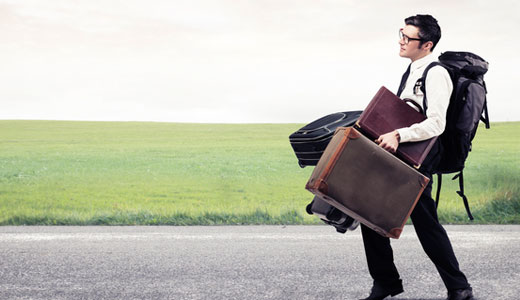Most of us know that one of the trickiest things about preparing for a long trip is deciding—out of all your many possessions—what to take with you.
You know the universal instruction: On the bed, lay out all the clothes you intend to pack, along with all the money. Then, take half the clothes and double the money. These days, with credit cards being accepted virtually everywhere, we’re likely to take only enough cash for tips and snacks; but the point is useful. Read those helpful travel tips. Plan carefully. Pack smart. Pack light.
As a seasoned traveler, I should be a pro at this. My husband is Mr. Pack At The Last Minute And Don’t Take Much. “Countries have stores with stuff if I need stuff,” he will invariably remind me with a slight frown. Unsaid, I hear, as you well know. I do spend a lot of time putting toiletries in small containers, counting out just the number of vitamins we’ll need, etc. Undaunted by my husband’s prescient reminder, however, I will continue my struggle with clothes: I’ll probably need this. And that. And another of those. So counting out twelve days of vitamins for two people and putting them in little baggies is canceled out. Every trip then has its moment of regret when I remember standing in my closet or opening drawers and withdrawing things that should not have come with me. Ultimately, I will have arrived at my destination, made memories, learned valuable/interesting/sometimes life-changing things, and ended the trip glad I had gone. But as I empty my suitcase, I will be reminded that a number of items were hauled across the world unnecessarily. And I will purpose to do better next trip. Every single time.
As my husband and I were making travel plans for this new year, and I was reading those helpful travel tips again, (and making a New Year’s resolution to actually practice them), I was reminded of the sermon preached at our church on Vision Sunday, always the first Sunday of each year. Our *pastor began his **message with these thoughts:
Often, at the beginning of a new year we think, ‘I’ll start from zero and do better.’ That’s not how God works. You probably went through some challenges this past year. There may have been places you wanted to grow, but didn’t. But progress was made, and you’re better now than you were before. Rather than starting from zero, build on the good God did in your life in 2024.
This will mean taking the time to reflect on the good God did in our lives. Writing it down. Praying a prayer of thanksgiving. For some episodes, we’ll keep the lesson learned—and discard the experience.
In the past few months I’ve listened to two books from which I’m taking some important lessons into this new year:
- John Mark Comer’s The Ruthless Elimination of Hurry. As a young pastor with a large church and ministry, Comer succumbed to the unceasing pressure, strain, and endless scheduling, and faced a choice: flame out, or change your way of living. Mentored by pastor and writer, John Ortberg, Comer took the following admonition of Christian philosopher, Dallas Willard, and began to reconstruct his life and the life of his family: “Hurry is the great enemy of the spiritual life in our day. You must ruthlessly eliminate hurry from your life.” Comer shares how he began to practice “the way of Jesus” with a desperate single-mindedness. As I listened, I thought about the many years I spent functioning with a low-grade anxiety and sense of urgency, a tendency to impatience and irritation, and habitually multitasking to Get Things Done. True, we can make excuses for the way we function—our family history, the way we were raised, responsibilities that come with particular seasons of life, etc. Truth is, we can control the pace of the way we live and establish a richly fulfilling and mindful life—a life modeled after the way of Jesus. Well worth reading or listening to.
- The second book is the newly updated version of Brant Hansen’s Unoffendable. Hansen, a nationally syndicated radio host and podcaster, addresses our tendency to (and default to) anger, the ways we justify it as Christians, and how the Bible dispels those ruinous notions. His straightforward (and frequently humorous) way of communicating effectively drives home his very serious points. See if you can read these quotes without some degree of recognition: “Quit trying to parent the whole world. Quit offering advice when exactly zero people asked for it. Quit being shocked when people don’t share your morality. Quit thinking you need to discern what other people’s motives are. And quit rehearsing in your mind what that other person did to you.” And, Yes, the world is broken. But don’t be offended by it. Instead, thank God that He’s intervened in it, and He’s going to restore it to everything it was meant to be.” Developing this attitude aligns us with Christ’s own. It attacks that subtle, low current, critical, faultfinding spirit that undermines our perspective and makes us vulnerable to the damaging work of anger. Highly recommended.
I share these recommendations with the hope that their lessons can help you—as they are helping me— build on the good we experienced last year, and travel lighter and more joyful on the way of Jesus.
*Our son
** start at 18:00

